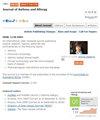Real-World Safety and Effectiveness of Benralizumab in Japanese Patients with Severe Asthma: A Multicenter Prospective Observational Study
IF 3.7
3区 医学
Q2 ALLERGY
引用次数: 0
Abstract
Introduction: This study aimed to demonstrate whether benralizumab maintained the safety and effectiveness profiles established in randomized controlled trials among all patients with severe uncontrolled asthma initially prescribed benralizumab in the real-world setting in Japan.Methods: This was a prospective, observational, multicenter post-marketing study (ClinicalTrial.gov, NCT03588546). The safety and tolerability of benralizumab over 1 year were assessed by the incidence of adverse events (AEs), serious AEs, adverse drug reactions (ADRs), and serious ADRs. Patient background characteristics indicating a more frequent onset of ADRs with benralizumab were explored. The main effectiveness assessment was the change in Asthma Control Questionnaire-5 (ACQ-5) score from baseline. Patients with baseline ACQ-5 scores ≥ 1.5 were defined as having severe uncontrolled asthma.
Results: In total, 632 patients were evaluated for safety and 274 for effectiveness; 139 patients were included in the severe uncontrolled asthma subgroup. ADRs were reported in 12.7% and serious AEs in 13.0% of patients. Serious infections occurred in 3.8%, serious hypersensitivity in 0.3%, and malignancy in 0.3% of patients. No helminthic infections occurred. In the effectiveness population, benralizumab improved the mean (standard deviation [95% confidence interval]) ACQ-5 score by − 1.16 (1.40 [− 1.36, − 0.96]) from baseline; forced expiratory volume in 1 second by 0.151 (0.440 [0.09, 0.21]) L; and Mini-Asthma Quality of Life questionnaire score by 1.16 (1.29 [0.94, 1.38]) at the last observation. The annual asthma exacerbation rate was 0.42. A greater ACQ-5 score improvement was observed among patients with eosinophilic asthma characteristics.
Conclusion: No new safety concerns were raised, and patients experienced benefits consistent with previous studies of benralizumab, thus supporting the use of benralizumab for the add-on maintenance treatment of patients with eosinophilic severe uncontrolled asthma.
Keywords: benralizumab, severe uncontrolled asthma, anti-interleukin-5 receptor α monoclonal antibody, eosinophils, exacerbation, asthma control, quality of life
本拉珠单抗在日本重症哮喘患者中的实际安全性和有效性:一项多中心前瞻性观察研究
简介:本研究旨在证明,在日本的真实世界环境中,所有初始处方苯拉利珠单抗的重度未控制哮喘患者是否保持了随机对照试验中确立的安全性和有效性特征:这是一项前瞻性、观察性、多中心上市后研究(ClinicalTrial.gov,NCT03588546)。根据不良事件(AEs)、严重AEs、药物不良反应(ADRs)和严重ADRs的发生率评估苯拉利珠单抗一年来的安全性和耐受性。研究还探讨了表明使用苯拉利珠单抗会更频繁发生 ADR 的患者背景特征。主要疗效评估是哮喘控制问卷-5(ACQ-5)得分与基线相比的变化。基线ACQ-5评分≥1.5分的患者被定义为严重不受控制的哮喘患者:共对 632 名患者进行了安全性评估,对 274 名患者进行了有效性评估;139 名患者被纳入严重不受控制的哮喘亚组。12.7%的患者报告了不良反应,13.0%的患者报告了严重不良反应。3.8%的患者出现严重感染,0.3%的患者出现严重过敏,0.3%的患者出现恶性肿瘤。无螺旋体感染发生。在有效人群中,苯拉利珠单抗可使ACQ-5评分的平均值(标准差[95%置信区间])比基线值提高-1.16 (1.40 [- 1.36, - 0.96]);1秒用力呼气容积提高0.151 (0.440 [0.09, 0.21])升;迷你哮喘生活质量问卷评分在最后一次观察时提高1.16 (1.29 [0.94, 1.38])。年度哮喘加重率为 0.42。嗜酸性粒细胞哮喘患者的 ACQ-5 评分提高幅度更大:关键词:benralizumab;重度未控制哮喘;抗白介素-5受体α单克隆抗体;嗜酸性粒细胞;哮喘加重;哮喘控制;生活质量
本文章由计算机程序翻译,如有差异,请以英文原文为准。
求助全文
约1分钟内获得全文
求助全文
来源期刊

Journal of Asthma and Allergy
Medicine-Immunology and Allergy
CiteScore
5.30
自引率
6.20%
发文量
185
审稿时长
16 weeks
期刊介绍:
An international, peer-reviewed journal publishing original research, reports, editorials and commentaries on the following topics: Asthma; Pulmonary physiology; Asthma related clinical health; Clinical immunology and the immunological basis of disease; Pharmacological interventions and new therapies.
Although the main focus of the journal will be to publish research and clinical results in humans, preclinical, animal and in vitro studies will be published where they shed light on disease processes and potential new therapies.
 求助内容:
求助内容: 应助结果提醒方式:
应助结果提醒方式:


